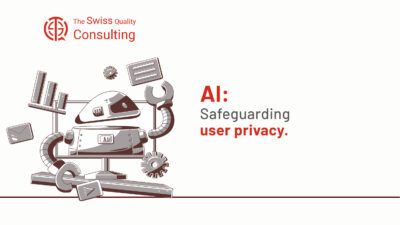Empowering Businesses to Leverage AI Responsibly and Ethically
Unleash the power of AI in the Middle East while safeguarding privacy! Discover how Privacy-Preserving AI (PP-AI) empowers businesses to thrive with responsible AI adoption. Explore the challenges of traditional AI, PP-AI solutions, and their benefits for business success in the region.
This article explores the growing importance of PP-AI in the Middle East business landscape. We will discuss the challenges of traditional AI and how privacy-preserving techniques can address them, ultimately contributing to long-term business success.
The Challenge: Balancing Innovation with Privacy
Traditional AI models often rely on vast amounts of personal data to train and operate effectively. While this data-driven approach fuels powerful AI applications, it raises critical questions about data privacy.
Data Breaches
Centralized storage of large datasets makes them vulnerable to cyberattacks. Leaks of sensitive customer or employee information can erode trust and damage a company’s reputation.
Regulatory Compliance
Governments across the Middle East are enacting stricter data privacy regulations, like the Saudi Arabia Personal Data Protection Law (PDP Law) and the UAE’s Data Protection Law. Non-compliance with these regulations can result in hefty fines and legal repercussions.
Ethical Concerns
The use of personal data for AI development raises ethical concerns, particularly regarding potential bias and discrimination in decision-making algorithms.
These challenges create a significant barrier for businesses seeking to leverage AI responsibly and ethically.
The Solution: Privacy-Preserving AI for a Sustainable Future
Privacy-preserving AI (PP-AI) offers a solution to these challenges, enabling businesses to reap the benefits of AI while safeguarding individual privacy. PP-AI utilizes various techniques to minimize the amount of personal data needed for AI training and operation. Here are some prominent examples:
Federated Learning
This technique allows AI models to be trained on decentralized datasets, eliminating the need for central storage of sensitive information. Each device or server trains a local model on its own data and then shares only the model updates, not the raw data itself.
Homomorphic Encryption
This technique allows computations to be performed on encrypted data, ensuring that sensitive information remains confidential even during processing. Businesses can analyze encrypted data to extract valuable insights without ever decrypting it.
Differential Privacy
This technique adds noise to data during the training process, making it statistically impossible to identify individuals within the dataset. Companies can leverage this technique to train AI models on real-world data while protecting individual privacy.
By adopting PP-AI techniques, businesses in the Middle East can:
Enhance trust with customers
By demonstrating a commitment to data privacy, businesses can build stronger trust and loyalty with their customers.
Mitigate compliance risks
PP-AI helps businesses comply with evolving data privacy regulations, reducing the risk of legal repercussions.
Unlock responsible innovation
PP-AI empowers businesses to leverage AI for ethical and responsible innovation, fostering a sustainable and inclusive digital future in the region.
In conclusion, privacy-preserving AI represents a critical paradigm shift in the Middle East’s AI landscape. By embracing PP-AI solutions, businesses can unlock the immense potential of AI while ensuring responsible data handling practices. This approach will ultimately contribute to long-term business success and reinforce the region’s position as a global leader in the responsible development and deployment of AI.
#PrivacyPreservingAI, #AIintheMiddleEast, #ResponsibleAI, #BusinessSuccess, #AIforGood























